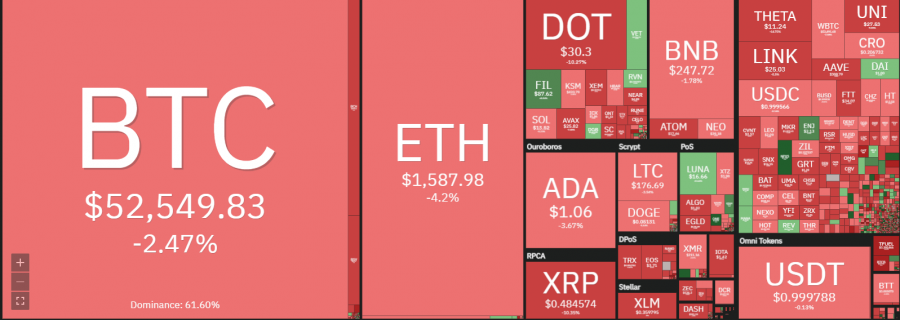The fast-evolving crypto market is presently facing a significant amount of selling pressure amid reports coming from Amundi, Europe’s largest asset manager, due to the impact regulations could have on cryptos.
At press time, the global crypto market plunged by 2.20% with a market value currently pegged at $1.64 trillion.
The crypto market has shed much of its stellar gains earlier recorded as significant selling pressure from crypto investors pushed the value of cryptos lower across the market spectrum amid profit-taking.
For the day, about 256,032 crypto traders were liquidated. The largest single liquidation order happened on Binance-DOT value of $35.59 million.
READ: America’s oldest bank set to accept Bitcoin
In the report, Amundi’s deputy CIO, Vincent Mortier and head of global views, Didier Borowski said that G7 regulators were “determined” to regulate cryptocurrencies. Such regulation will likely “initially lead to an adjustment of their price, possibly brutal.”
Consequently, credible reports also reveal that the Bank of Boston and Massachusetts Institute of Technology are jointly working on delivering a Central Bank Digital Currency prototype before the end of July.
Such digital assets could fundamentally change US citizens’ use of capital, leading some financial brands to lobby the Fed and Congress to pause its creation.
READ: Cardano on a high buying spree, explodes by 20%
“Everyone is afraid that you could disrupt all the incumbent players with a whole new form of payment,” said Michael Del Grosso an analyst for Compass Point Research & Trading LLC.
That being said, the report stated that once the regulatory environment is sorted out and the main risks addressed, the crypto market might bounce stronger.
“Only once the regulatory environment has stabilized, and the relationship with CB [central bank] digital currencies has been clarified, will asset managers be able to recommend digital assets as safe investment vehicles.
“At the end of the day, investments in CCs [cryptocurrencies] may be promising, but they are still speculative in nature,” they concluded.















